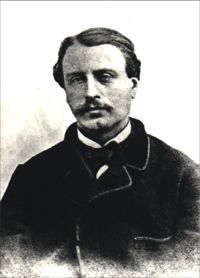Les Chevaliers de la Table ronde (Hervé)

Les Chevaliers de la table ronde is an operetta by Hervé to a libretto by Henri Chivot and Alfred Duru. The work had its first performance in 1866 at the Théâtre des Bouffes-Parisiens. It was the composer's first attempt at a full-length opéra bouffe. The burlesque plot is barely connected with Arthurian legend[1] but rather presents a fantasy vision of a magical age of chivalry.[2] Hervé and his librettists created a rich ensemble piece with a large number of supporting roles including four ludicrous knights and parts for women including Mélusine, Totoche and Angélique who parody the stereotypical "female" traits of sensuality, love, jealousy and greed.[2] In contrast, Merlin, Rodomont, and Roland portray a watered-down version of knightly derring-do.[3]
The music mixes accessible melody, zany virtuosity for the soloists, parody of "serious" classical music and opera, and vital, energetic rhythms.[3]
The operetta was revived in 2015 by the company Les Brigands and performed November 2015 at the Opéra National de Bordeaux, followed by a 15 city tour.[4][5]
References[edit]
- ^ Kurt Gänzl - The Encyclopedia of the Musical Theatre: A-Gi 2001- Page 360 0028655729 "A burlesque of the heroic age, which was only marginally connected with the Arthurian legend, Les Chevaliers de la table ronde was Hervé's first attempt at a full- length opera-bouffe. The young Chivot and Duru provided him with a libretto ..."
- ^ a b "Les Chevaliers de la Table ronde". Palazzetto Bru Zane. Retrieved 11 January 2019.
- ^ a b ""Les Chevaliers de la Table ronde": Hervé's Masterwork Rediscovered". Operetta Research Center. 19 February 2016. Retrieved 11 January 2019.
- ^ Radio podcast (French) about the 2015 production
- ^ “Les Chevaliers de la Table ronde”: Hervé’s Masterwork Rediscovered Michael H. Hardern Operetta Research Center 19 February, 2016
